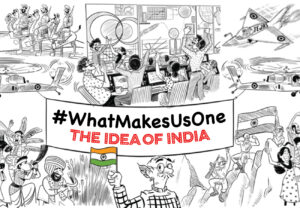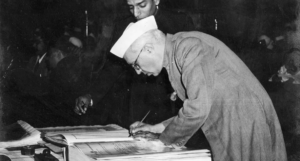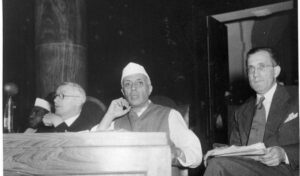Even as human vultures of a wide amalgam train their guns on Nehru’s 17 years as Prime Minister, and his role in India’s freedom struggle and the struggle of the Non-aligned movement, what stands out today – are many of Nehru’s thoughtful writings, his letters to Chief Ministers, his regular press conferences, and of course his thoughts on freedom of the press and journalists’ rights and freedom. His role in caring more for journalists rights and their freedoms, even perhaps more than problems of big press barons, is specially noteworthy. It is more noteworthy specially today, when manifold journalists rights and freedoms specially their right to livelihood are trampled upon as never before, by contracts of bondage and selective press bashings, in an undeclared emergency situation, while a indeed a pre-election ad-boom for some newspapers has begun. Today -when hundreds of journalists and co-workers are on the roads despite sham acknowledgements of recognizing them as Covid warriors notwithstanding. Indeed, they never had it so bad. Infact, the majority of journalists and co-workers are shut out or in some cases working from home to benefit emergent signs of government drumbeating journalism.
Born in this new era, are black labour codes, which seek to end the era of labour struggles including the Working Journalist Act and of course the current Majithia Award which remains by and large unimplemented. In fact, the Working Journalists Act, and wage boards, are seeing a slow death, without even any alternative structure for the wide spectrum emerging. Infact, using Covid as an excuse ,for mass retrenchment in phases targeting wage board and most senior journalists along with others specially critical journalists. Simultaneously, the right to cover Parliament has been reduced to a virtual lottery to cap it all. Today, the once famous national agencies like the PTI and UNI along with their language counterparts are being squeezed of funds, and UNI is on the verge of collapse. Many journalists and co-employees of the United News of India are on the roads while a few are languishing with virtually no salary and a questionable provident fund. From what was once called the slaughter of Samachar during emergency times, today you have the slaughter the very concept of an autonomous corporation replacing Prasar Bharati and replacing it Man- Ki- Baat or Modi speaks to the nation or establishment reporting .
As a close follower- yet critique of Mr. Nehru the late Mr. PN Haksar- had said years ago, while delivering the Sarojini Naidu memorial lectures: “Despite his many failures, Nehru’s humanism, his deep concern about promoting scientific temper in our society, his dedication to secularism and his upholding of the values of democracy in our country are of continuing relevance. Our ancient society can never modernize itself unless we work out in detail the imperatives dictated by scientific temper, by the processes of secularization and of democracy. These imperatives would include not merely economic development but, even importantly, the fundamental transformation of our value system of our thinking processes and of our social structure.” Infact, the concept of a scientific temper which was born as a result of the Press Commissions report has seen no follow up. Further more, there has been no Press Commission after the first two Press Commissions when a Media Commission today by an act of Parliament to covered the wide spectrum media is overdue.
Equally clear today is the fact that the era of Nehru’s monthly historic press conferences is clearly over with the present prime minister having said goodbye to them with his Man-Ki -Baat and select press briefings to a select few. Some were even extempore one of his press advisors Phenendra Vajpayee once told me years after Nehru’s death.
That to some extent Mr. Nehru enjoyed being lampooned in cartoons is very clear in his clear words to one of the most famous cartoonist in India of his time Shanker Pillai , whom he told at the inauguration of his cartoons by Shanker : ‘Don’t Spare me Shanker’ and indeed Shanker did not spare him . Both followed is an interesting book of some 1,500 cartoons of Jawaharlal Nehru, most of them in Shankar’s Weekly. This compilation is made from nearly 400 cartoons from the Weekly.
Set in chronological order, the cartoons show the Nehru Era as Shankar saw unfold itself in the first phase of Nehru’s rule.
Nehru As A Journalist
Indeed Nehru began his earlier career as a journalist, infact a journalist crusader campaigning for the freedom struggle as a Congress leader. Later though many of his books became best-sellers, he did not claim to be a writer. Nehru, like Gandhi, was for the times, a great journalist, infact a journalist cum activist for the freedom struggle. Later, Nehru took much interest in the press because he felt that it had a role to play in national life after independence and also in support of a policy of Non-alignment and struggles for the developing world. Similarly his ‘Discovery of India’ was till recently considered important reading material for students studying history.
Freedom of the press was a part of the democratic process to him and he accepted that criticism even if it was strong and intolerant, was a part of it. He often not only tolerated criticism but appreciated it, if the level was high: what upset him were malice, lack of dignity, or ignorance of history. But overall he up-held the principle of a free press even when he did not often respect sections of the press for not being equal to the high standards he expected of them.
As one of his admirers and himself an editor Chalapathi Rau said in his book on Nehru “For him freedom of the press consisted essentially of editorial freedom and not of freedom of the owner of the press. He disliked press barons of all kinds and post-war developments in the Indian press oppressed him so much that he took interest in the appointment of Press Commission.
Nehru was fully aware of the role of the newspaper proprietor and the conflict that occur with the exercise of Press freedom. Therefore, addressing the AINEC again on September 17, 1952, he felt that “ the money, the owner and the proprietor are major factors. Does the freedom of the Press ultimately mean the freedom of the rich man to do what he likes with his money through the Press?… So it may be that the freedom of the writer to write what he will but rather of the owner of a newspaper to see that the writer writes something that he wants him to write…Therefore, the freedom for the Press may come to mean the freedom of persons who have knack of making money.
Even as a politician Nehru would not be far removed from the journalist. In fact, he himself equated the one with the other on one occasion by saying thus rather candidly: “Politicians and journalists have much in common. Both presume to talk too much, to write too much, to deliver homilies; both, generally speaking, require no qualifications at all for their job. Needless to say his sermons to the news paper owners indeed do suggest that he would have castigated newspaper owners for what is now known as the paid newspaper syndrome, or advertorials appearing as editorials.
As the former Editor of National Herald M. Chalapathi Rau and leader of the undivided journalist movement said he indeed did take Interest in Practical Problems of the press- particularly of the journalists. He noted:“After the fierce debates, mainly between press lords and the Home Minister, on the amendments to article 19 of the Constitution in 1951, Jawaharlal Nehru started taking a practical interest in problems of the press. There was talk of an inquiry into what was the basis of freedom of the press, whose freedom it was, and how that freedom was exercised, and whenever I saw him in those days, mainly in his house, I saw on his table a copy of the report of the Royal Commission on the Press. He was studying it closely, and he took great interest in the appointment of the Indian Press Commission (The First Press Commission). ……
Respect for Press freedom
Earlier too, as has been observed by Mr. Rau, Jawaharlal Nehru as a congress leader, journalist and freedom fighter- had high professional standards and sought: them in the daily or weekly operation of press freedom. He always advised us to refer to the British authorities debatable news items, with disputable facts, coming from Congress sources. Would not the British or any other authorities deny facts that went against them? It did not matter, he said; they should be given their chance. If they gave their version, it should be also published. This was even in the old days. The soundness of his advice was proved when for a one-sided version, emanating from Congress sources and carelessly edited and published, the editor had to go to jail for criminal libel. Should the editor apologise? The directors were fumbling and the editor did not know what to do. From prison, Jawaharlal Nehru sent instructions that the case must be fought, and if the editor was sentenced, it was all right; it would do him good. The flag was never to be lowered, and so we lived dangerously, from day to day, till the British authorities swooped on us one day. Turned us out, and put the offices under lock and key”, said Chalapthi Rau.
When one thinks of the sedition law today as it is being used it would not be difficult to stress that he would have opposed many such measures including recent measures where the press persons complained of Parliament passes being selectively given. Infact, only a few days ago a senior journalist, Anant Bagaitkar resigned from the Media advisory committee of the Rajya Sabha. Infact on December 22, only the Press Club of India on the very last day of the Parliament organized the seminar on ‘The Reciprocal Relations Between Parliament and Media’, At the same seminar the leader of the Congress in the position sent a message on the issue of media being denied entry. This is what Mr. Kharge said. ‘Media is the fourth pillar of democracy. It is through the press that vital information about parliamentary debates reaches people. It is the Parliament’s role to make laws and to discuss issues that matter to common people. Government does not want Parliament to function. The suspension of 12 Rajya Sabha MPs is testament to this. It also objects to the media giving voice to opposition. With this mindset, not just the media, but all pillars of democracy are under threat.”Kharge added in a letter to the Press Club of India.
On the other hand, Nehru too it is quite well-known, was quite unused to having journalists demonstrating vocally and marching on the roads to meet him. But this is how he reacted to perhaps the first such demonstration that he faced.“In 1957, the proprietors of The Hindu, Madras sacked their Legal Correspondent in Delhi M.K. Ramamurthi, for his trade union activity. So incensed were the journalists that they took a decision to march to Nehru’s house. At a hurriedly called meeting, a letter was sent to Nehru stating that journalists would come to his house the following morning hoping to be received by him.
Here is a field report by one of the founders of the journalist movement Mr. B.R.Vats :” It was a great achievement, indeed, for middle class people with all their prejudices and inhibitions of their class taking resort to a procession in the street to protest against injustice. Nehru was annoyed with the letter. But when the procession reached his house, he did call a delegation of five. The present writer was a member of this delegation. Nehru told us, “So you served notice on me last night that you would march on my house and I must receive you.”
We told him that it was not notice but the situation had arisen so suddenly that the rank and file of the Delhi Union of Journalists, demanded that a procession be taken out immediately to Nehru’s house.
Nehru described the action of the Hindu proprietors in sacking Ramamurthi as “badtameezi” , which has a wider connotation than a literal translation, “unmannerlines” in English can convey. It meant that this was not a civilized way of dealing with employee-employer relations. He even agreed to the demand for the Press Commission to look into their grievances it was indeed formed and was an eye opener for its times and was formed by an act of Parliament and very expert for its times including not only journalists but jurists and Parliamentarians too.
Take the case of the United Press of India, a nationalist news agency of the times facing grim possibilities of closure. Unions like the IFWJ then and the Delhi Union of Journalists (DUJ) were supporting the journalists. In this case Nehru did intervene in vain .A touch of McCarthyism prevailed. Pandit Pant called UPI a ‘den of communists ‘. Morarji Desai told a delegation of UPI employees “Do you want me to open a relief kitchen for you?” The delegation walked out in protest and so. Gradually UPI was finished. Ironically the chapter is forgotten. Here was an agency that played a glorious role in the freedom struggle. Infact, many leaders from Mahatma Gandhi, Jawaharlal Nehru , Khan Abdul Ghaffar Khan down to Jagjivan Ram and Jainaryan Vyas indeed were some of its honorary correspondents. And indeed at that time the British owned API was blacking out his speeches of India’s freedom fighters. Doesn’t all this ring a bell today. See what is happening to the employees say in UNI today specially the journalists and their wages. See the salary sheets of the new managers and the wages due to hundreds of employees. This UNI even now is known to have perhaps the best network by way of an Urdu service. We have seen failed attempt by an Indian Murdoch to take it over and run it successfully. Attempts were made to substitute with the RSS’s Hindustan Samachar. There is a central building, there are offices all over the country in prime locations and their journalists are on the roads, some living in starvation, some living with reduced salaries.
Tailpiece
It is quite well known Mr. Jawaharlal Nehru was in touch with artists, writers, philosophers and well-known personalities from all over the world, besides of course our Indian National movement leaders, international personalities like Bertrand Russell, Tolstoy, Tagore and Einstein among others. He indeed was a man of letters. Many wrote to him with utmost frankness. Infact, here is a letter to Nehru from Bernard Shaw from way back in September 1948.(The letter speaks for itself source ‘a bunch of old letters).
“Dear Mr. Nehru,
I was greatly gratified to learn that you were acquainted with my political writings; and I need hardly add that I should be honored by a visit from you, though I cannot pretend that it will be worth your while to spend an afternoon of your precious time making the journey to this remote village, where there is nothing left of Bernard Shaw but a doddering old skeleton who should have died years ago.
I once spent a week in Bombay, another in Ceylon; and that is all I know at first hand about India. I was convinced that Ceylon is the cradle of the human race because everybody there looks an original. All other nations are obviously mass products.
Though I know nothing about India except what is in the newspaper I can consider it objectively because I am not English but Irish, and have lived through the long struggle for liberation from English rule, and the partition of the country into Eire and Northern Ireland, the Western Equivalent of Hindustan and Pakistan. I am as much a foreigner in England as you were in Cambridge.
I am wondering whether the death of Jinner will prevent you from coming to England. If he has no competent successor you will have to govern the whole Peninsula. Faithfully, Bernard Shaw.”
(S.K. Pande is a veteran journalist. He is also the president of Delhi Union of Journalists and National Alliance of Journalists. Courtesy: Countercurrents.org.)




